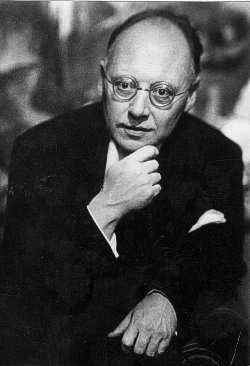Submissions/Saving Egon Petri
|
This is an accepted submission for Wikimania 2012. |
- Submission no.
252
- Title of the submission
Saving Egon Petri
- Type of submission (workshop, tutorial, panel, presentation)
presentation
- Author of the submission
Richard J. Walker
- E-mail address
richard . j . walker @ gmail . com
- Username
reechard
- Country of origin
United States
- Affiliation, if any (organization, company etc.)
- Personal homepage or blog
- Abstract (at least 300 words to describe your proposal)
In 2009 I had a unique opportunity and privilege to secure this photo of Egon Petri for the future. In doing so, I learned about Polish copyright law, the public domain, and why so much of 20th century culture will be lost. The tsunami of digital media today washes away our memory of decades past, while the incredibly draconian copyright laws dissuade us from saving it. I ask you to consider how my single small victory against cultural amnesia might inform a discussion on what is possible, likely, or futile. Lifetime plus seventy is enough time to forget why we should care about photos, letters or unpublished works. Should they be stored and catalogued until the copyright term expires, it is probable that natural decay will have made the effort pointless.
Even if the copyright term were restored to something reasonable, we have another problem, and that is the automatic transfer of rights of authorship. One problem comes to light in the litigation against the book The Wind Done Gone. Another problem is how to deal with a deceased person's possessions. The heir inherits the remaining copyright term, so all of the original works in possession are encumbered by copyright. Even if the heir were willing to release all rights, they do not necessarily know to whom the work is of interest. I argue that inheriting the rights of authorship is simply wrong, and what should be transferred is only the right to profit from the work for the remaining term. The right to profit from someone else's unpublished work is therefore questionable in my mind.
Let me illustrate an absurdity. Suppose your dear devout Grandmother dies leaving you everything, including evidence of an interesting, secret life. Amongst her belongings is a photograph of her in fragrante delicto with a former President of the United States. The roll of film is clearly hers, taken with her camera. She appears in a few photos by asking people to snap them for her. Thoughtlessly, she dies without filing the proper documents with the authorities, and as the heir, you have now inherited seventy year's worth of ... the right to track down the photographer and get a release. Who is dead.
What if copyright terminated on death? The funeral is an opportunity to share freely and celebrate the deceased, by offering photo albums and other digitized memorabilia. The author's letters are shared by his friends and fans. The composer's unfinished music is made available to musicians. The only problem with the above scenario is that corporations never die, and they will never agree to a reduction in copyright. Corporations hold most of the valuable copyright, and in their greed they have made it illegal to save the recent past for the benefit of the near future.
- Track
WikiCulture and Community; Research, Analysis, and Education
- Length of presentation/talk
- 5 minutes
- Will you attend Wikimania if your submission is not accepted?
no
- Slides or further information (optional)

Ruch Muzyczny (Polish music magazine)
Public-domain (Poland and USA) image of Egon Petri
- Special request as to time of presentations
Interested attendees
If you are interested in attending this session, please sign with your username below. This will help reviewers to decide which sessions are of high interest. Sign with four tildes. (~~~~).
- Amir E. Aharoni (talk)
- Zellfaze (talk) 19:42, 19 March 2012 (UTC) Highly interested.
- Airwolf (talk) 20:09, 22 March 2012 (UTC)
- UseTheCommandLine (talk) 14:21, 12 July 2012 (UTC)
- Add your username here.
